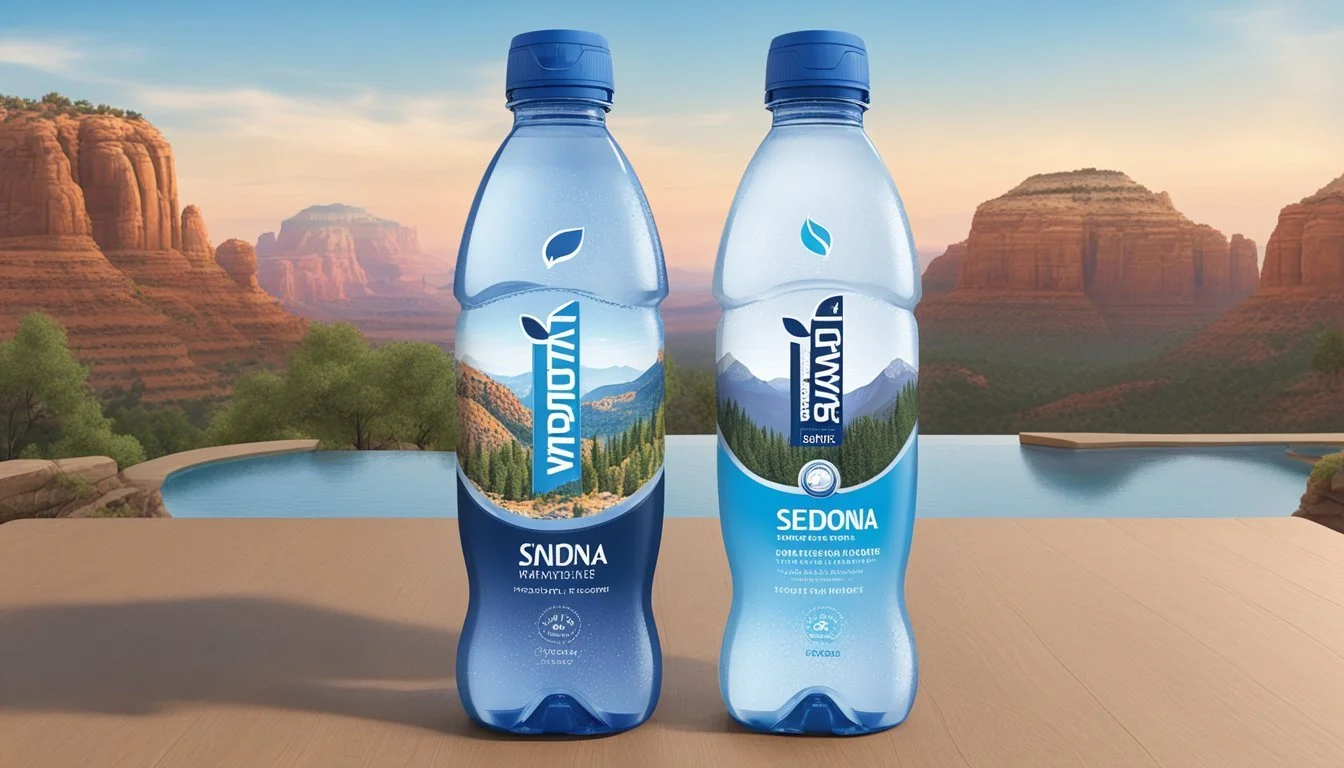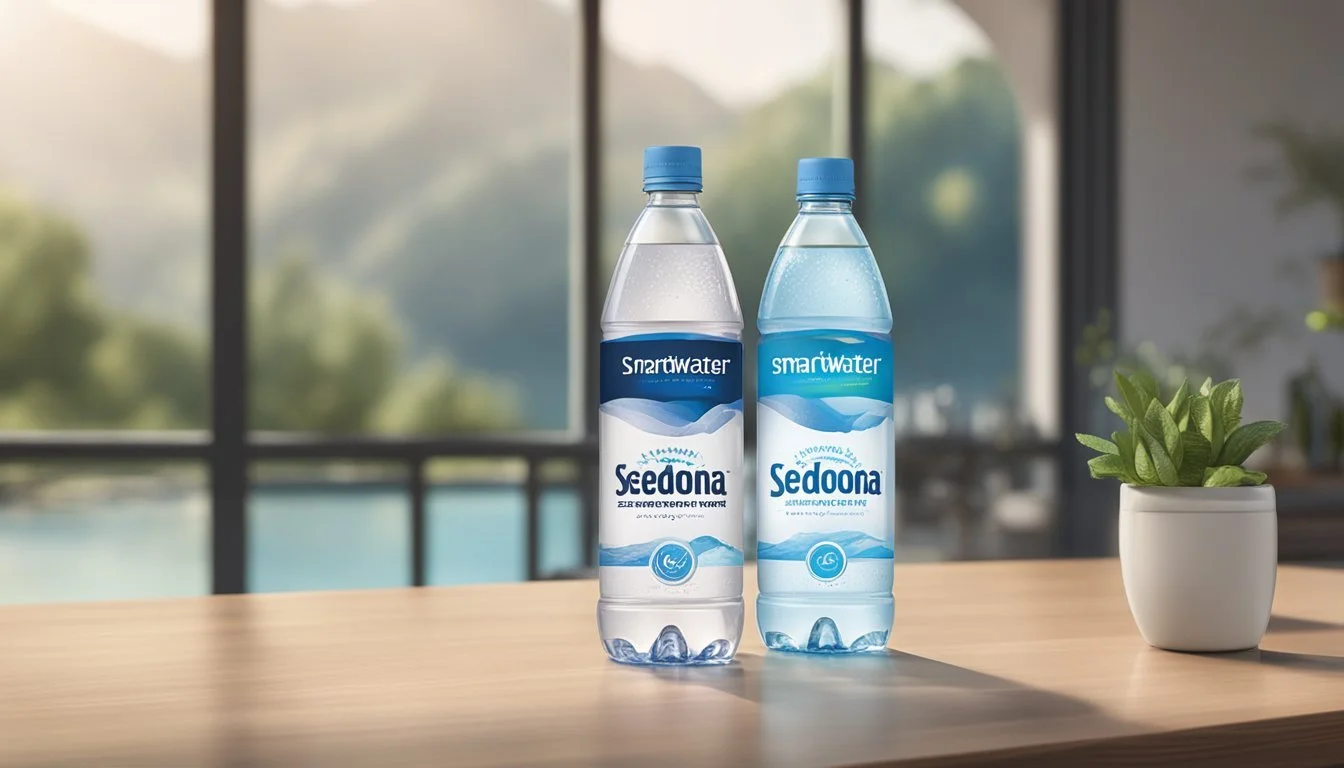Smartwater vs. Purely Sedona
Comprehensive Comparison for the Best Choice
When it comes to bottled water, discerning between brands can make a significant difference in taste and health benefits. Smartwater and Purely Sedona stand out among the many choices available. With their unique purification methods and distinct flavor profiles, these two brands cater to different preferences and needs.
For those who prioritize purity and consistency, Smartwater offers a finely filtered experience with added electrolytes for enhanced taste. On the other hand, Purely Sedona, sourced from artesian wells, delivers a natural and crisp mineral-rich hydration experience. Each brand brings its own strengths to the table, making the choice largely dependent on individual taste and hydration goals.
By evaluating aspects such as mineral content, taste, and environmental impact, we can better understand what sets these two brands apart. Whether you seek the sophisticated simplicity of Smartwater or the artisanal allure of Purely Sedona, this comparison will help you decide which bottled water better suits your lifestyle.
Understanding Bottled Water
Bottled water varies widely in types, regulations, and safety standards, affecting hydration, health benefits, and environmental impact. It is essential to recognize these differences to make informed choices.
Types of Bottled Water
Bottled waters fall into several categories, each with distinct features:
Spring Water: This water is collected directly from a natural spring. It often contains various minerals, providing a unique taste. Purely Sedona, for instance, is a type of spring water.
Purified Water: Subject to additional purification processes such as reverse osmosis, distilled, or deionized, removing contaminants and making it ultra-clean. Smartwater is known for its purification process.
Mineral Water: Contains a specific amount of dissolved minerals and is sourced from mineral springs. These minerals can offer health benefits.
Alkaline Water: Has a higher pH level, thought to neutralize acid in the body. Notable for its potential health advantages.
Sparkling Water: Infused with carbon dioxide gas, making it fizzy. It can be spring water or purified water with added carbonation.
Regulations and Safety
Bottled water is regulated to ensure safety and quality. In the United States, the FDA oversees bottled water as a packaged food product.
FDA Standards: Bottled water must meet FDA regulations for contaminants like lead, arsenic, and mercury. These standards are similar to EPA regulations for tap water to ensure safety and purity.
Contaminants: Bottled water undergoes testing for fluoride, ensuring safe levels. Both spring and purified waters are scrutinized to prevent harmful contaminants, which is crucial for health.
Labeling Requirements: Labels must accurately describe the water type and source, giving consumers transparency about their purchases.
Understanding these regulations helps consumers trust that their bottled water is safe for hydration and health benefits.
The Brands in Focus
SmartWater and Purely Sedona are both premium bottled water brands, yet they differ significantly in terms of origin, processing, and marketing strategies. Understanding these differences helps consumers make informed choices.
SmartWater Overview
SmartWater is a brand owned by Coca-Cola and stands out due to its patented vapor distillation process. This technique mimics the natural hydrological cycle by heating the water and collecting the resulting steam, thereby removing impurities.
Electrolytes like calcium, magnesium, and potassium are added to enhance the taste. Marketed as an upscale alternative to tap water, SmartWater focuses on purity and hydration. Its association with Coca-Cola gives it strong brand recognition and distribution capabilities, making it widely available.
Environmental impact is mitigated through initiatives such as using recycled plastic in their bottles. Nonetheless, being part of a large corporation draws scrutiny regarding sustainability practices.
Purely Sedona Background
Purely Sedona emphasizes its natural spring water origins, sourced from the Oak Creek Canyon in Arizona. The brand prides itself on purity, leveraging the minimal human intervention in its water collection process. The focus is on maintaining the water’s original mineral content and natural taste.
Their branding highlights local heritage, aiming to attract eco-conscious consumers. Purely Sedona is more accessible in terms of price, ranging from $1.50 to $3.00 per bottle, making it an appealing option for budget-conscious buyers.
Environmental impact is a key concern, and the brand uses eco-friendly practices in bottling and distribution. Pulled from a natural source, this water appeals to those who prefer minimal processing.
Composition and Purity
When comparing Smartwater and Purely Sedona, the composition and purity of each bottled water brand are essential factors. These elements primarily involve mineral content and pH balance, which impact the overall quality and potential health benefits of the water.
Analyzing Mineral Content
Smartwater undergoes a thorough distillation process, followed by the addition of electrolytes like calcium, magnesium, and potassium. This enhances the taste and makes it suitable for those seeking a clean and crisp hydration option. The electrolytes also play a role in maintaining fluid balance in the body.
Purely Sedona emphasizes its natural mineral content, derived from the artesian springs in Sedona, Arizona. The water naturally contains bicarbonate, calcium, and magnesium, which contribute to its refreshing taste. The presence of these minerals supports overall health, aiding in bone strength and muscle function.
In summary, Smartwater's mineral profile is curated through supplementary additions post-distillation, while Purely Sedona relies on its natural source for essential minerals.
Water pH Balance Concerns
Smartwater typically has a neutral pH around 7.0, due to its purification process involving reverse osmosis and vapor distillation. The neutral pH ensures that the water is neither too alkaline nor too acidic, suiting a wide variety of consumers without significantly impacting their body's pH levels.
Purely Sedona, sourced from natural springs, often leans towards a slightly alkaline pH. This can range from 7.5 to 8.5. The alkaline nature is attributed to the natural mineral content, which can help neutralize acidity in the body, potentially benefitting those with higher acid diets.
In conclusion, both Smartwater and Purely Sedona offer distinct advantages in terms of pH balance, catering to different preferences and potentially influencing overall health outcomes through their unique compositions.
Taste and Hydration Efficacy
Smartwater is known for its distinct taste, which has been described as clean and crisp. This is due to its vapor-distillation process, which imitates the natural hydrological cycle. The added electrolytes—calcium chloride, magnesium chloride, and potassium bicarbonate—enhance the flavor without overwhelming the palate.
On the other hand, Purely Sedona offers a refreshingly pure taste that comes from its natural artesian source. This brand does not add any extra ingredients, relying solely on the natural mineral content to enrich the flavor.
When it comes to hydration efficacy, Smartwater's electrolytes can be advantageous. Electrolytes help balance fluid levels, which can improve overall hydration, especially after physical activity.
For those seeking natural purity, Purely Sedona produces its water from an artesian well, free from artificial additives.
In terms of taste, preference largely depends on individual tastes. Smartwater's slightly enhanced mineral flavor contrasts with Purely Sedona's more subtle, natural profile.
Hydration Comparison:
Brand Key Characteristics Smartwater Vapor-distilled, contains added electrolytes Purely Sedona Natural artesian source, no added ingredients
Taste preferences can be subjective, with some individuals preferring Smartwater's enhanced flavor and others favoring the natural taste of Purely Sedona.
Packaging and Environmental Concerns
Packaging choices significantly affect the sustainability and environmental impact of bottled water brands. Analyzing the materials used and their impact provides insight into the ecological footprint of Smartwater and Purely Sedona.
Analyzing the Materials
Smartwater primarily uses plastic bottles for its packaging. These bottles are designed for convenience but introduce concerns related to BPA and plastic degradation. Smartwater's focus on lightweight, recyclable plastic aims to reduce waste but does not eliminate the inherent issues of plastic.
Purely Sedona, in contrast, uses glass bottles. Glass is valued for its purity and inert nature, avoiding the risks associated with plastic chemicals. It is more easily recyclable without quality degradation. Despite higher transportation weights, the durability and inertness of glass make it a preferred option for consumers focusing on environmental health.
Impact of Bottles on the Environment
Plastic bottles, as utilized by Smartwater, contribute significantly to plastic waste and environmental impact. Globally, plastic waste presents a growing problem, with many bottles ending up in landfills or oceans. The production and disposal of plastic bottles generate substantial CO2 emissions, increasing their environmental footprint.
Conversely, Purely Sedona opts for glass, which is more sustainable in the long run. Glass bottles can be reused and recycled efficiently without compromising material quality. Though glass production is energy-intensive, the lifecycle of glass bottles results in lower long-term environmental degradation compared to plastic.
Both brands strive for sustainability, but the choice of material plays a crucial role. Aligning packaging with environmental goals, such as reducing waste and lowering CO2 emissions, can make a significant difference in ecological impact.
Cost and Accessibility
When comparing the cost and accessibility of Smartwater and Purely Sedona, several factors come into play. Smartwater is often priced slightly higher due to its vapor-distillation process and the addition of electrolytes for taste. Purely Sedona, emphasizing local sourcing and purity, may vary in price depending on regional availability.
In terms of accessibility, Smartwater has a broader distribution network. It's easily found in supermarkets, convenience stores, and online platforms across the globe. This widespread availability makes it more convenient for consumers to purchase.
Purely Sedona, on the other hand, highlights its local heritage and purity. It might not be as readily available in all markets, particularly outside the United States. For those within its distribution area, it can be found in select stores and natural food markets.
For consumers seeking alternatives, both brands offer unique benefits. Filtered tap water remains a cost-effective and environmentally friendly option. While it may lack the branded appeal, it can be of comparable quality if the local water infrastructure is reliable.
Considering cost and accessibility, Smartwater has a slight edge due to its extensive distribution network. Purely Sedona, though potentially more limited in availability, appeals strongly to those prioritizing local and pure water sources.
More About Smartwater
Core Hydration vs Smartwater: Which Bottled Water is Better?
Icelandic Glacial vs Smartwater: Which Bottled Water is Better?
Mountain Valley Spring Water vs Smartwater: Which Bottled Water is Better?
Nestle Pure Life vs Smartwater: Which Bottled Water is Better?
San Pellegrino vs Smartwater: Which Bottled Water is Better?
Smartwater vs Aqua Carpatica: Which Bottled Water is Better?
Smartwater vs Cascade Mountain: Which Bottled Water is Better?
Smartwater vs Crystal Geyser: Which Bottled Water is Better?
Smartwater vs Hawaii Volcanic: Which Bottled Water is Better?
Smartwater vs Hawaiian Springs: Which Bottled Water is Better?
Smartwater vs Kirkland Signature: Which Bottled Water is Better?
Smartwater vs Richard's Rainwater: Which Bottled Water is Better?
Smartwater vs Solan de Cabras: Which Bottled Water is Better?
Smartwater vs Talking Rain AQA: Which Bottled Water is Better?
Smartwater vs Whole Foods 365: Which Bottled Water is Better?
Smartwater vs Whole Foods Italian Still Mineral water: Which Bottled Water is Better?
More About Purely Sedona
Aqua Carpatica vs Purely Sedona: Which Bottled Water is Better?
Boxed Water vs Purely Sedona: Which Bottled Water is Better?
Castle Rock vs Purely Sedona: Which Bottled Water is Better?
Core Hydration vs Purely Sedona: Which Bottled Water is Better?
Hawaii Volcanic vs Purely Sedona: Which Bottled Water is Better?
Hawaiian Springs vs Purely Sedona: Which Bottled Water is Better?
Ice Mountain vs Purely Sedona: Which Bottled Water is Better?
Icelandic Glacial vs Purely Sedona: Which Bottled Water is Better?
Mountain Valley Spring Water vs Purely Sedona: Which Bottled Water is Better?
Nestle Pure Life vs Purely Sedona: Which Bottled Water is Better?
Poland Spring vs Purely Sedona: Which Bottled Water is Better?
Purely Sedona vs Cascade Mountain: Which Bottled Water is Better?
Purely Sedona vs Crystal Geyser: Which Bottled Water is Better?
Purely Sedona vs Crystal Lake: Which Bottled Water is Better?
Purely Sedona vs Essence pH10: Which Bottled Water is Better?
Purely Sedona vs Kirkland Signature: Which Bottled Water is Better?
Purely Sedona vs Liquid Death: Which Bottled Water is Better?
Purely Sedona vs Proud Source: Which Bottled Water is Better?
Purely Sedona vs Richard's Rainwater: Which Bottled Water is Better?
Purely Sedona vs Simple Truth: Which Bottled Water is Better?
Purely Sedona vs Talking Rain AQA: Which Bottled Water is Better?
Purely Sedona vs Weird Water: Which Bottled Water is Better?
Purely Sedona vs Whole Foods 365: Which Bottled Water is Better?
Purely Sedona vs Whole Foods Italian Still Mineral water: Which Bottled Water is Better?
San Pellegrino vs Purely Sedona: Which Bottled Water is Better?
Solan de Cabras vs Purely Sedona: Which Bottled Water is Better?
Zephyrhills vs Purely Sedona: Which Bottled Water is Better?








